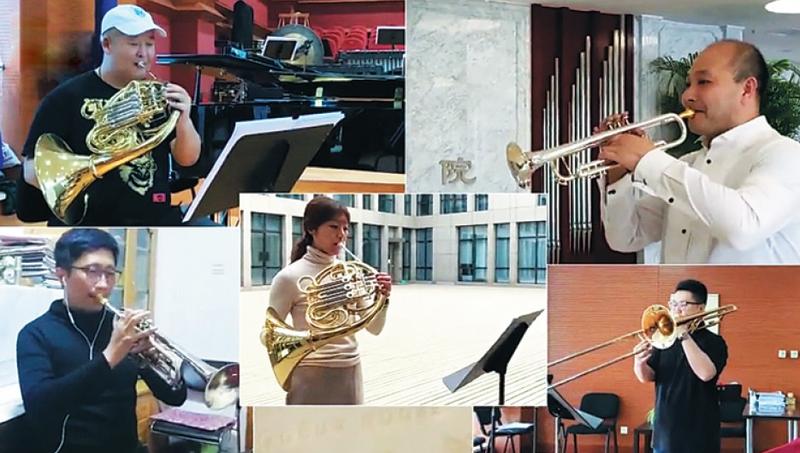 A screenshot of musicians of China's Liaoning Symphony Orchestra collaborating with the Cairo Symphony Orchestra to present an online ensemble of Triumphal March. (PHOTO PROVIDED TO CHINA DAILY)
A screenshot of musicians of China's Liaoning Symphony Orchestra collaborating with the Cairo Symphony Orchestra to present an online ensemble of Triumphal March. (PHOTO PROVIDED TO CHINA DAILY)
CAIRO-Musicians from China and Egypt staged an online concert of classical music on Saturday to mark the 64th anniversary of the establishment of diplomatic ties between the two countries.
The performance of China's Liaoning Symphony Orchestra and the Cairo Symphony Orchestra amazed the Egyptian audience who followed the concert online on several social media networks.
"The performance is breathtaking. It brings the people of the two nations together," Yossif Mohammed, a 26-year-old Egyptian, says over the phone after the concert.
They not only presented highlevel art performances ... but also created a successful example of bilateral cultural and artistic exchanges
Shi Yuewen, Chinese cultural counselor in Egypt
Despite the spread of coronavirus, the young man says that the two nations have proven again that nothing can block their cooperation and friendship.
ALSO READ: Chinese film wins award at Egypt festival
"I hope that more concerts would be held to let us enjoy the Egyptian and Chinese art. I'm in love with Egyptian and Chinese music," Mohammed says.
During the concert, Egyptian and Chinese musicians played a number of Chinese, Egyptian and international songs and symphonies such as Jasmine Flower, The Yellow River, There is Something Sweet About It by Egyptian composer Omar Khairat, and Beethoven's masterpiece Egmont Overture.
Hand in Hand, a song written by Shi Yuewen, cultural counselor of the Chinese embassy in Egypt and head of the Chinese Cultural Center in Cairo, and composed by Egyptian musician Ehab Hamid, was also performed by Egyptian singer Reham Abdel-Hakim.
"I really love the Hand in Hand song. I was surprised to know that the lyrics of the song were written by a Chinese diplomat," Mohammed says.
For his part, Shi, the cultural counselor, says this concert is a continuation of the online ensemble Triumphal March launched by Chinese and Egyptian musicians previously.
"They not only presented high-level art performances to the audiences of the two countries, but also created a successful example of bilateral cultural and artistic exchanges through high-tech during the epidemic," he says.
He says the preparation of the concert has involved many difficulties, and it took nearly two months for the whole preparation process.
"I believe we can dedicate more wonderful artistic performances to the people of the two countries in the future," Shi says.
Mohamed Helmy, the Egyptian concert coordinator, says the orchestras played music that represented their cultures, which created a cultural bridge between the two countries.
"We wanted to deliver a message under the critical circumstances that we are experiencing due to the spread of the coronavirus that nothing can stop our contact with our friends in China," Helmy says during a phone interview.
He emphasizes that the concert was also a message to the whole world that closing the borders does not mean that people cannot communicate, noting that the use of technology brings people closer to each other.
The concert coordinator notes that Chinese music is no longer unfamiliar to the Egyptians because cultural cooperation, especially in the field of music, has reached very advanced stages, as many Chinese artistic groups have performed in Egypt in recent years.
READ MORE: Ancient Civilizations Forum meets in Beijing
Under the worldwide spread of the COVID-19, China and Egypt have been cooperating closely in fighting the pandemic through exchanging medical aid and expertise and offering mutual support and solidarity.
In mid-May, Egyptian and Chinese musicians staged a virtual performance of the Triumphal March from the opera Aida to inspire people in such difficult times.
In March, Egypt lit up three well-known historical sites, including ancient temples in Luxor and Aswan, in red and golden stars to resemble the national flag of China as a sign of solidarity against the novel coronavirus.


